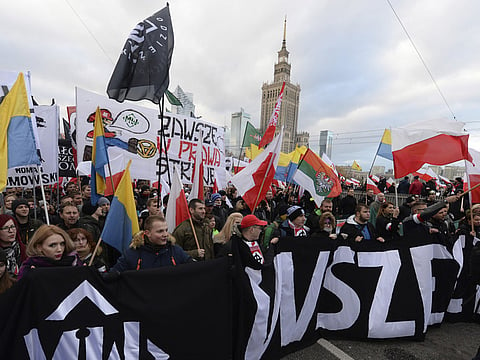Neo-fascists in Poland suddenly feel enabled and encouraged
The radical group suddenly feels enabled and encouraged by the new conditions in their country, in Europe and in the world

Like every country in Europe — as well as the United States — Poland has long had a far-right, neo-fascist fringe. It also had a tiny eco-warrior fringe, an Esperanto-speaking fringe and quite a few other grouplets. But during the two-and-a-half decades that followed the end of Communism in Poland, Polish neo-fascists were never numerous enough to be taken seriously.
Even when they began, a few years ago, to march on November 11, Poland’s Independence Day — a day when official ceremonies already include national flags, patriotic songs and even people dressed in First World War uniforms — no one thought much about a few hundred football hooligans on the sidelines.
This year, 60,000 “patriotic” marchers showed up. Although they weren’t all neo-fascists by any means, they did include a significant group of (mostly) men marching under the names of pre-war nationalist groups and behind racist signs: “White Europe”, or “Europe Will Be White”, or “Clean Blood”. Attempting to portray the march as a normal patriotic outing, Polish state television interviewed one of the participants live on camera, asking him cheerfully why he had come. “To get the Jews out,” he declared — an awkward answer for the pro-government journalist, who quickly moved on.
What has changed? The answer has partly to do with the current populist-nationalist ruling party, Law and Justice, which welcomed and encouraged the march as a “patriotic” action, though the party knew who was behind it. Polish police, once trained to protect the public against neo-fascists, this time arrested 50 members of a pro-democracy group that staged a counter-protest, though they did nothing to stop “patriots” from beating up another group of counter-protesters.
State media, which is now a mouthpiece for the ruling party, covered the march extensively and positively. As of this writing, there has been no official attempt to criticise or push back against any of the slogans or signs.
I am extremely sorry to say that the answer has also to do with a part of the country’s clergy. Although most of the senior church hierarchy (including the primate) condemn radical slogans and groups, there are a few priests who encourage the neo-fascist right. On the day of the march, one Polish woman reported that she had entered a church where men were wearing armbands marked with the political symbols of the far-right. She unfurled a banner with a quote from Pope John Paul II, Poland’s great pope: “Racism is a sin.” She was unceremoniously thrown out.
But the international context has also changed. Nowadays, neo-fascism and open racism are no longer the province of national parties. In part as a consequence of the borderless Europe they claim to hate, these are now international movements. Large contingents of Hungarian, Slovak and Italian neo-fascist groups came to Warsaw to join the march; for the first time, international alt-right trolls were also actively supporting the march on Twitter and elsewhere, “alt-right” being the modern-sounding term for neo-fascist.
Loud ‘patriot’
There is a Russian angle, too, although few in this Polish government want to admit it. Just like everywhere else, there is support for the most discordant far-right elements of Polish politics, especially online. Poland’s divisive defence minister, a particularly loud “patriot”, has strange Russian links as well.
Finally, some of those marching also believe they have support from the US. The American president’s speech in Warsaw a few months ago was partly written by advisers who understand the language and thinking of the alt-right, and, as I wrote at the time, it was heard by the ruling party as a stamp of approval. Like their comrades in Charlottesville, Poland’s neo-fascists think that US President Donald Trump’s populist language is meant to encourage them, too.
For all of those who tune in to Polish politics only occasionally, please remember the broader context: The groups that displayed themselves so aggressively in Warsaw last Saturday are not the majority in Poland. They are not even a significant minority. They are a radical group that suddenly feels enabled and encouraged by the new conditions in their country, in Europe and in the world. But even if they don’t set the tone for public life, in Warsaw — a city that was destroyed by fascists, where old buildings are still pockmarked by bullet holes from fascist rifles; a city that also now hosts the most ambitious and beautiful museums in Europe — their new sense of entitlement is indeed shocking.
— Washington Post
Anne Applebaum is a columnist and Pulitzer Prize winning author who has written extensively about Europe. She is a visiting professor of practice at the London School of Economics.
Sign up for the Daily Briefing
Get the latest news and updates straight to your inbox


